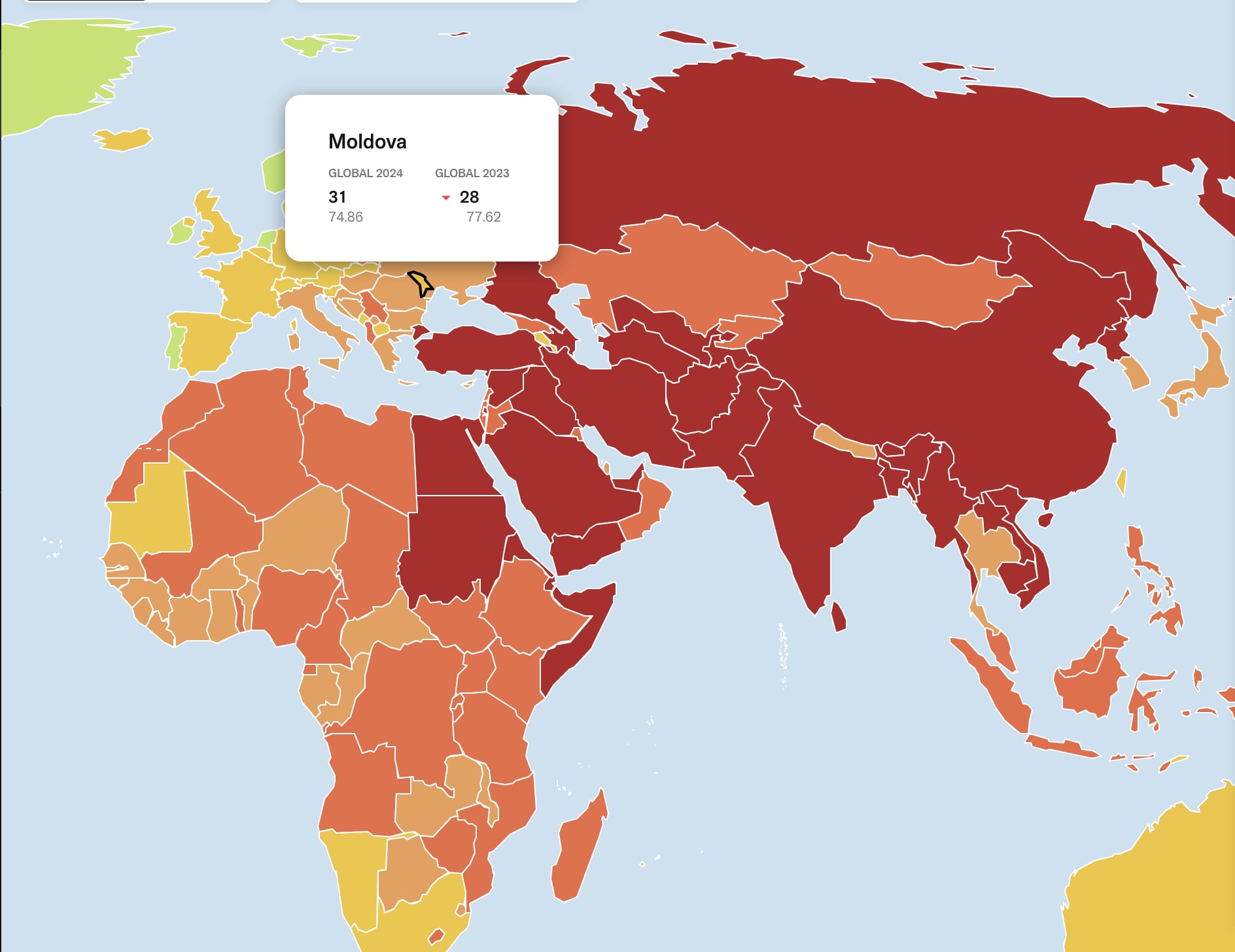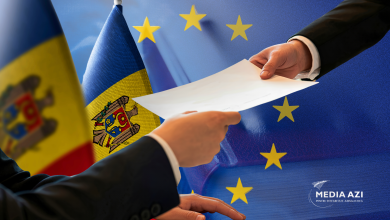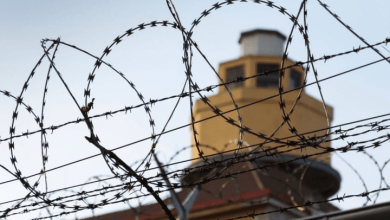Press Freedom Index 2024: Moldova Loses Three Positions and Ranks 31st. Press around the Globe Is Threatened by Politicians
Felicia Nedzelschi

The Republic of Moldova ranks 31st out of 180 states in the World Press Freedom Index 2024 published by the organization Reporters Without Borders (RSF). Therefore, our country currently located between Spain and Austria has lost three positions compared to the previous year when it ranked 28th. In spite of a certain regress, the Republic of Moldova ranks higher than Romania (49th), Ukraine (61st), and Russia (162nd place). The top of the countries with the freest press is starts with Norway which is followed by Denmark and Sweden.
Profile of the Republic of Moldova
According to the country’s profile, “Moldova’s media are divided into pro-Russian and pro-Western camps. Oligarchs and political leaders strongly influence their editorial stances.”
“Like the country itself, the media landscape is polarised and marked by the influence of Ilan Shor, a pro-Kremlin oligarch who has gone into exile to escape prosecution on corruption charges. The media empire built in recent years by companies linked to Shor has been weakened by the suspension of the licences of six channels, including TV6 and Orizont TV, in December 2022 and November 2023. The licences of four other channels linked to Vladimir Plahotniuc, an oligarch and former Democratic Party of Moldova leader, also in exile, were also suspended in November 2023. The content of these media outlets has migrated online to their websites and social media,” the Reporters Without Borders report states.
As to the audiovisual sphere, “measures taken by the Audiovisual Council have tightened control over disinformation and hate speech, and have weakened media outlets that broadcast propaganda content produced in Russia.”
The organization also states that, in spite of the fact that the Republic of Moldova has a free press, several media outlets are the mouthpieces of their patrons. Access to information is sometimes insufficient, and defamation lawsuits are common. RSF is also concerned about “the rapid and non-transparent changes to legislation at the end of 2023,” when TV channels whose licenses had been suspended were blocked.
The report states that independent media outlets lack sufficient financial resources; they seek support from foreign donors, and face challenges when trying to hire qualified reporters. “Journalists can be the target of insults and intimidation by politicians. Their supporters sometimes resort to cyber-harassment against reporters deemed hostile to their ideas,” the report emphasizes.
Global Situation
The freedom of the press around the globe is threatened by those who are supposed to be its guarantors, i.e. by the political authorities. Reporters Without Borders conclude that, among the five indicators which were used in order to compile the ranking, the political indicator deteriorated the most, registering an average global decrease of 7.6 points.
In Eastern Europe and Central Asia, censorship intensified, especially in Belarus (down 10 to 167th), Georgia (103rd), Kyrgyzstan (120th), and Azerbaijan (down 13 to 164th). “Kremlin influence has reached as far as Serbia (down seven to 98th), where pro-government media carry Russian propaganda and the authorities threaten exiled Russian journalists. Russia (162nd), where Vladimir Putin was unsurprisingly reelected in 2024, continues to wage a war in Ukraine (61st) that has had a big impact on the media ecosystem and journalists’ safety,” Reporters Without Borders mention. Ukraine climbed 18 positions after improving its political and security indicators, and fewer journalists lost their lives in 2023.
In Romania (49th), “the market is diversified but fragmented, with many TV channels whose sustainability is unstable.” The report mentions that editorial decisions in Romania are often subordinate to their owners’ interests, turning the media into a propaganda tool. Political parties can get favorable media coverage for media funding, and populist politicians use an aggressive political discourse towards journalists. Nevertheless, the neighboring country has managed to climb four positions since last year.
In general, at the international level, “this year is notable for a clear lack of political will on the part of the international community to enforce the principles of protection of journalists.” The war in Gaza has been marked by a record number of violations against journalists and the media. More than 100 Palestinian reporters have been killed by the Israel Defence Forces, including at least 22 in the course of their work, according to the authors. Occupied and under constant Israeli bombardment, Palestine is ranked 157th out of 180 countries and territories surveyed in the overall 2024 World Press Freedom Index, but it is ranked among the last 10 with regard to security for journalists.
The countries ranking the lowest are Afghanistan (down from 152 to 178), Syria (down from 175 to 179), and Eritrea (down from 174 to 180). In the latter country, the media is subject to the absolute will of President Issayas Afeworki accused of crimes against humanity according to the UN report dated June 2016. The state has no independent media outlets, and journalists remain detained for longer terms than in any other state.
Worldwide, 12 journalists have been killed and 570 are in detention since the beginning of this year.



